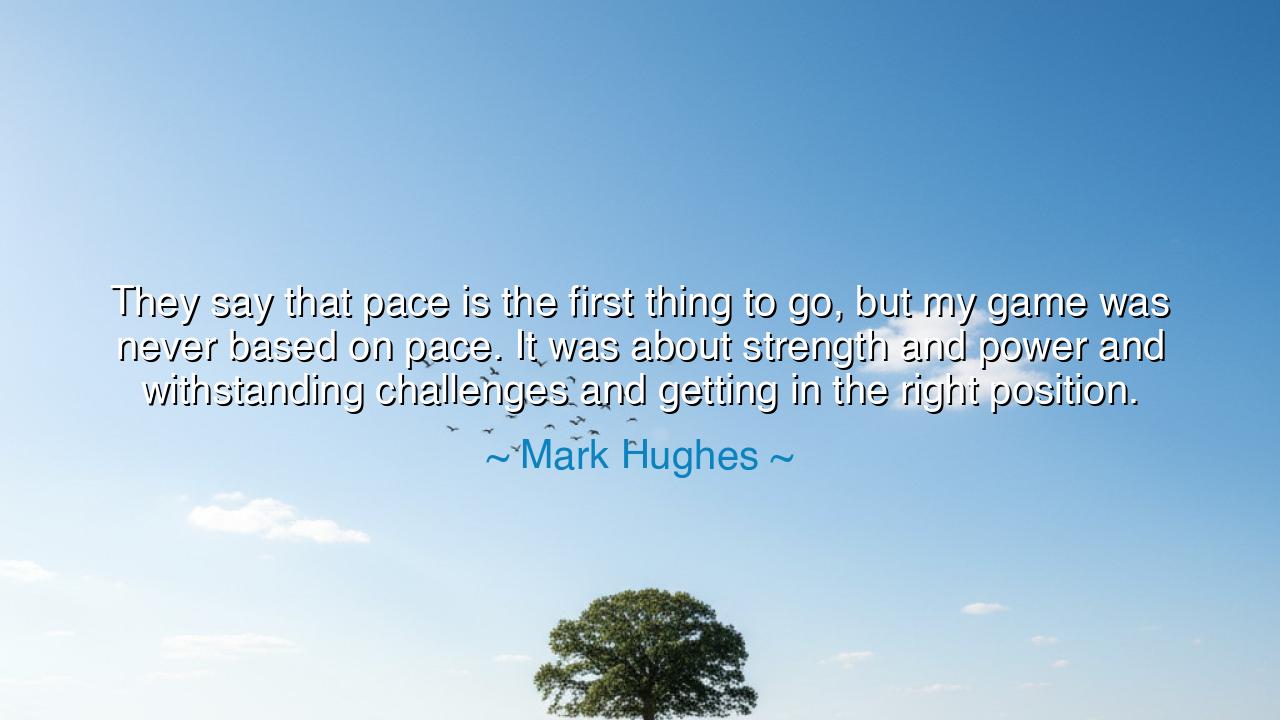
They say that pace is the first thing to go, but my game was
They say that pace is the first thing to go, but my game was never based on pace. It was about strength and power and withstanding challenges and getting in the right position.






Hear the words of Mark Hughes, warrior of the football field, who once declared with the voice of experience: “They say that pace is the first thing to go, but my game was never based on pace. It was about strength and power and withstanding challenges and getting in the right position.” These words, born of the sport but reaching beyond it, carry the wisdom of endurance, the lesson that while youth may blaze with speed, true mastery is built on qualities that time cannot so easily erode.
The origin of this saying lies in the career of Hughes himself, known to his peers and fans not as a man of lightning sprint but as one of strength, power, and resilience. In the rough battles of English football, he was renowned for holding the ball, for resisting defenders, for using intelligence and positioning rather than relying on fleeting pace. While many players found their careers shortened as their legs lost speed, Hughes endured, proving that the athlete who builds on deeper foundations can withstand the tests of age and challenge.
This lesson is not confined to football. Recall the story of the great Roman general Fabius Maximus, called the “Cunctator,” the Delayer. Against Hannibal, whose armies swept like fire through Italy, Fabius did not attempt to outrun him with reckless speed. Instead, he relied on positioning, endurance, and the strength to withstand blows without breaking. The people mocked his slowness, yet in time they understood: it was his resilience, not pace, that saved Rome from ruin. Hughes’s words echo this same truth: greatness lies not in the sprint alone, but in the capacity to endure and resist.
At the heart of this saying is the wisdom of adaptation. Pace fades, beauty fades, even raw energy fades—but qualities like strength, courage, and wisdom only deepen with time. Hughes reminds us that if we build our life only on what is temporary, we will falter when those gifts diminish. But if we build on foundations of resilience, discipline, and intelligence, we shall endure long after the fleeting brilliance of youth has passed. True power lies not in speed, but in steadfastness.
There is also here a lesson in strategy. To “get in the right position” is not only about football—it is about life. Many rush forward blindly, relying on speed, and find themselves burnt out or lost. But the wise person chooses their position carefully, sees the field clearly, and acts with precision at the right moment. Strength, then, is not only physical but also mental: the power to wait, to endure, to strike when the time is right.
Consider also the example of Winston Churchill. In his youth, he was mocked, dismissed, and often out of step with the pace of politics. Yet when the storm of war descended, it was not quickness that the nation needed, but strength, resolve, and the power to withstand endless challenges. Churchill, like Hughes, showed that greatness is not found in keeping pace with the crowd, but in standing firm when all others fall away.
The lesson for us is this: do not build your life solely on fleeting gifts. Do not envy those who outpace you in youth, for their speed may vanish. Instead, cultivate within yourself the enduring virtues: strength of character, resilience under trial, and the wisdom to act with precision. When challenges come, these qualities will sustain you long after the first fire of energy has dimmed.
Thus, O seeker, remember Hughes’s words. Life will strip away your pace, your ease, even your youthful brilliance. But if you have built your game, your work, your very soul on strength, power, endurance, and wisdom, you will remain unshaken. In the end, it is not the sprinter who endures, but the one who stands firm, who withstands challenge, who finds the right position when the world presses hardest. This is the teaching of Mark Hughes, and it is the teaching of life itself.






AAdministratorAdministrator
Welcome, honored guests. Please leave a comment, we will respond soon